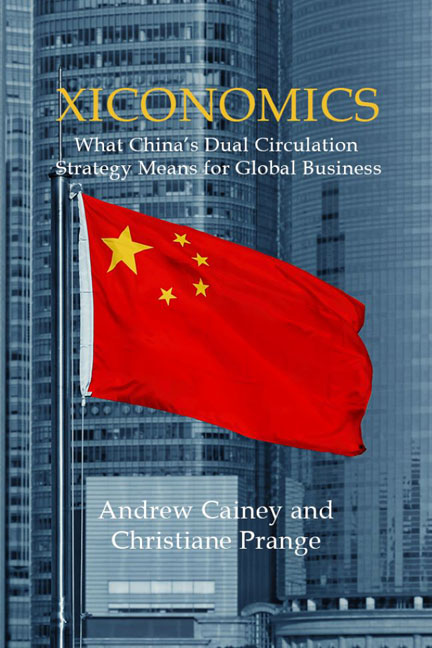52084 results in International relations and international organisations
The Ideology of Brazilian Parties and Presidents: A Research Note on Coalitional Presidentialism Under Stress
-
- Journal:
- Latin American Politics and Society / Volume 66 / Issue 1 / February 2024
- Published online by Cambridge University Press:
- 24 January 2024, pp. 178-188
-
- Article
-
- You have access
- Open access
- HTML
- Export citation

Shaping Peacebuilding in Colombia
- International Frames and Spatial Transformation
-
- Published by:
- Bristol University Press
- Published online:
- 23 January 2024
- Print publication:
- 26 July 2023

Xiconomics
- What China's Dual Circulation Strategy Means for Global Business
-
- Published by:
- Agenda Publishing
- Published online:
- 23 January 2024
- Print publication:
- 27 April 2023

War, Technology and the State
-
- Published by:
- Bristol University Press
- Published online:
- 23 January 2024
- Print publication:
- 31 July 2023

Belt and Road
- The First Decade
-
- Published by:
- Agenda Publishing
- Published online:
- 20 January 2024
- Print publication:
- 30 March 2023

Grand Strategy and the Rise of China
- Made in America
-
- Published by:
- Agenda Publishing
- Published online:
- 20 January 2024
- Print publication:
- 30 June 2023

In the Beginning
- Secretary-General Trygve Lie and the Establishment of the United Nations
-
- Published by:
- Bristol University Press
- Published online:
- 18 January 2024
- Print publication:
- 24 January 2023

Humour and Politics in Africa
- Beyond Resistance
-
- Published by:
- Bristol University Press
- Published online:
- 18 January 2024
- Print publication:
- 27 March 2023
5 - Uses of the Work of International Law Commission on State Responsibility in International Investment Arbitration
- from Part II - The Interpretation of Secondary Rules in International Investment Law
-
-
- Book:
- Custom and its Interpretation in International Investment Law
- Published online:
- 04 January 2024
- Print publication:
- 18 January 2024, pp 93-122
-
- Chapter
-
- You have access
- Open access
- HTML
- Export citation
Part IV - Concluding Thoughts
-
- Book:
- Custom and its Interpretation in International Investment Law
- Published online:
- 04 January 2024
- Print publication:
- 18 January 2024, pp 333-345
-
- Chapter
-
- You have access
- Open access
- HTML
- Export citation
14 - Custom and Its Interpretation in International Investment Law
- from Part IV - Concluding Thoughts
-
-
- Book:
- Custom and its Interpretation in International Investment Law
- Published online:
- 04 January 2024
- Print publication:
- 18 January 2024, pp 335-345
-
- Chapter
-
- You have access
- Open access
- HTML
- Export citation
Copyright page
-
- Book:
- Custom and its Interpretation in International Investment Law
- Published online:
- 04 January 2024
- Print publication:
- 18 January 2024, pp iv-iv
-
- Chapter
-
- You have access
- Open access
- HTML
- Export citation
Table of Cases
-
- Book:
- Custom and its Interpretation in International Investment Law
- Published online:
- 04 January 2024
- Print publication:
- 18 January 2024, pp xvi-xxxv
-
- Chapter
-
- You have access
- Open access
- HTML
- Export citation
11 - Bilateral Investment Treaties, Investor Obligations and Customary International Environmental Law
- from Part III - Interpreting Customary International Rules
-
-
- Book:
- Custom and its Interpretation in International Investment Law
- Published online:
- 04 January 2024
- Print publication:
- 18 January 2024, pp 261-283
-
- Chapter
-
- You have access
- Open access
- HTML
- Export citation
10 - Police Powers in a Pandemic
- from Part III - Interpreting Customary International Rules
-
-
- Book:
- Custom and its Interpretation in International Investment Law
- Published online:
- 04 January 2024
- Print publication:
- 18 January 2024, pp 233-260
-
- Chapter
-
- You have access
- Open access
- HTML
- Export citation
Foreword: Custom and International Investment Law
-
- Book:
- Custom and its Interpretation in International Investment Law
- Published online:
- 04 January 2024
- Print publication:
- 18 January 2024, pp xiv-xv
-
- Chapter
-
- You have access
- Open access
- HTML
- Export citation
7 - Conclusion
-
- Book:
- The Justice Factory
- Published online:
- 01 December 2023
- Print publication:
- 18 January 2024, pp 277-298
-
- Chapter
- Export citation
13 - A TWAIL Engagement with Customary International Investment Law
- from Part III - Interpreting Customary International Rules
-
-
- Book:
- Custom and its Interpretation in International Investment Law
- Published online:
- 04 January 2024
- Print publication:
- 18 January 2024, pp 307-332
-
- Chapter
-
- You have access
- Open access
- HTML
- Export citation
12 - The Role of Customary International Law in International Investment Law Remedies
- from Part III - Interpreting Customary International Rules
-
-
- Book:
- Custom and its Interpretation in International Investment Law
- Published online:
- 04 January 2024
- Print publication:
- 18 January 2024, pp 284-306
-
- Chapter
-
- You have access
- Open access
- HTML
- Export citation
5 - ICC Legal Argumentation
-
- Book:
- The Justice Factory
- Published online:
- 01 December 2023
- Print publication:
- 18 January 2024, pp 178-227
-
- Chapter
- Export citation

